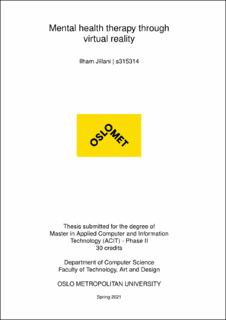| dc.description.abstract | In the current COVID climate many people have been affected by mental health challenges. Hence, a proof-of-concept dissertation that aims to showcase and prove how VR can be used for mental health care and therapy was developed. In order to prove this, a VR game, a survey, and user testing were conducted using a smartphone that could run the application on a Android smartphone. The smartphone can also be used with a headset if preferred for a better VR experience.
Furthermore, the development of the VR application was with the multiplatform game-engine Unity and also the main framework of the whole idea. To create the different objects in the application, the open-source 3D creation suite, Blender, was used, which is also supported by Unity. Additionally, the platform Mixamo to create character rigs and animations. Furthermore, Blendswap and the Unity asset store for readymade 3D objects and assets. Moreover, Github was used for version control, and MeisterTask in order to work more agile with a Kanban board similar tool.
After reading the dissertation, one may feel that the tools that were used together with the application could be because of a limited budget. In fact, this is also one of the main purposes of the application. The application should be affordable, usable and cost-effective for anyone who has a smartphone. Nevertheless, the application was user tested with only a smartphone, which can be placed into a simple VR headset if preferred for a better VR experience by the user who was participating in the user testing.
Finally, for future work, more advanced VR headsets with better view angles will also be used to see if there is any difference in experience and how it affects the behaviour of the user. This will also be valuable for the research community because there is limited information and research conducted in the area of behaviour change of VR users. | en_US |
